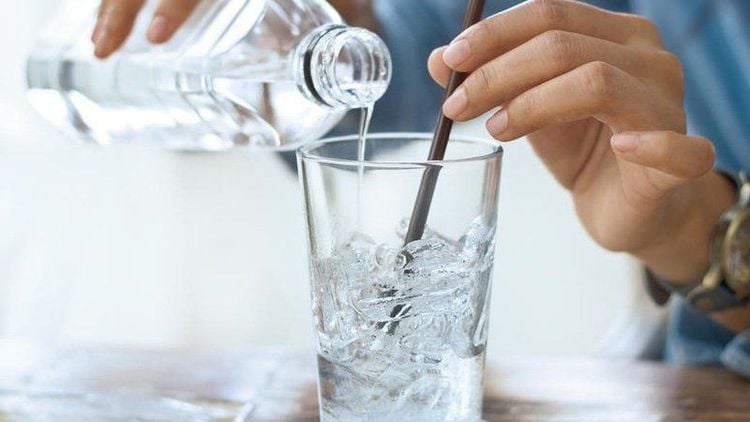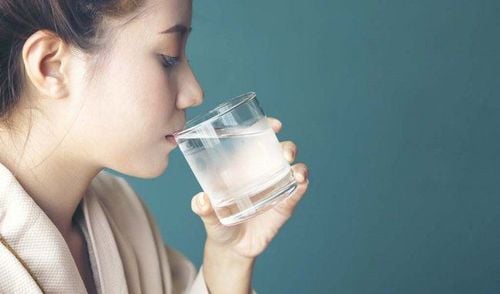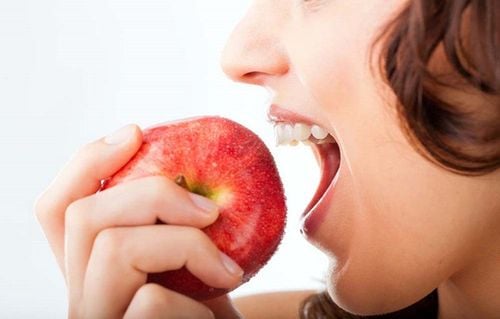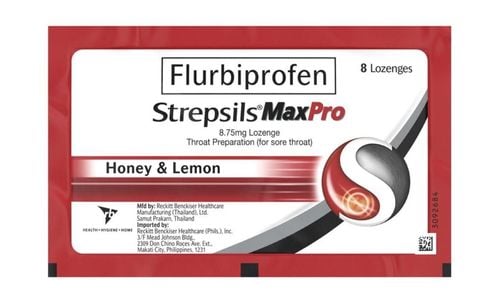This article has been reviewed by Senior Doctor, Specialist Level II Đoàn Dư Đạt – Internal Medicine Doctor, Department of General Examination & Internal Medicine, Vinmec Hạ Long International Hospital.
Drinking water has been proven to provide numerous health benefits, both mentally and physically. However, many people are still uncertain whether drinking cold water is good for them or if it can aid in weight loss. Below are the potential risks and benefits of drinking cold water.
1. Is Drinking Cold Water Good for You?
Difficulty in Digestion
Some people believe that drinking cold water is a bad habit that can harm long-term health. According to this perspective, cold water consumption causes stomach muscles to contract, making it harder to digest food after meals. Additionally, some believe that the body has to work harder to maintain its internal temperature of 37°C when drinking ice water or water below 4°C.
Nasal Congestion and Breathing Difficulties
In reality, drinking cold water can affect the body in unexpected and undesirable ways. A 1978 study found that consuming cold water thickens nasal mucus, making it harder to pass through the respiratory tract. In comparison, experts observed that soups and warm beverages generally help improve breathing. Thus, if you are trying to recover from a cold or the flu, drinking cold water might worsen nasal congestion.
Headaches and Sore Throat
Cold water consumption may exacerbate certain health conditions. For example, a 2001 study linked drinking cold water to triggering migraines in people prone to this condition. Additionally, pain related to esophageal spasms (achalasia) - a condition that restricts the passage of food through the esophagus - can worsen when consuming cold water during meals. Cold water is also unsuitable for individuals with hypertension, as it can cause blood vessel constriction, increasing the risk of complications such as stroke.

- Imbalance in the Body
In traditional Chinese medicine, drinking cold water with hot food creates imbalance. Meals in Chinese culture are typically served with warm water or hot tea. This viewpoint is also widely accepted in various other cultures worldwide.
Some also argue that drinking cold water on hot days does not help cool the body, merely quenching thirst momentarily and leading to further dehydration. However, there is insufficient evidence to confirm or refute this claim.
2. Benefits of Drinking Cold Water
On the other hand, drinking cold water offers certain benefits. For example, consuming cold water during exercise can prevent the body from overheating, allowing for smoother workouts. This is because cold water helps maintain a lower core body temperature.
Additionally, drinking water, regardless of its temperature, has been shown to provide the body with more energy to stay active throughout the day. Water is essential for life, and individuals looking to lose weight should prioritize staying hydrated.
When it comes to the question, “Does drinking cold water help with weight loss?” experts state that cold water not only keeps the body healthy but also reduces appetite and burns calories, thereby aiding in achieving desired weight goals.
Drinking Water Helps Reduce Appetite
Consuming a large glass of water can help curb cravings for snacks and reduce food intake during meals, as the stomach feels fuller with water and less room is left for food. A study revealed that overweight individuals who drank 500 ml of water 30 minutes before meals for 12 weeks lost over 1.4 kg more than those who did not.
Boosts Metabolism
Research conducted in Germany found that water promotes fat burning.
Drinking two large glasses of water at room temperature increased metabolic rates by 30% within 30 minutes.

Stronger Impact of Cold Water on Weight Loss
Drinking ice water for weight loss can help burn extra calories during digestion. This is because the body must work harder to maintain its core temperature by warming the ingested cold water. A study indicated that consuming 250 ml of cold water burns 7 calories. Over a week, drinking 10 glasses of cold water daily could burn 490 calories. Maintaining this habit might help you lose 3 kg by simply drinking ice water.
Thus, drinking plain water - whether cold or warm - replacing sugary beverages, is excellent for digestion and maintaining a healthy weight. However, there is no significant evidence supporting the claim that cold water is more effective for weight loss than warm water. Ice water alone does not have as much impact as exercise and a proper diet. Therefore, the ideal formula for achieving a healthy weight is eating properly, exercising regularly, and drinking water (with or without ice) instead of sugary drinks like bubble tea, soda, or coffee.
3. Is Warm Water Better Than Cold Water?
Drinking warm water may support digestion, improve circulation, and help the body eliminate toxins faster. However, there are some considerations when choosing warm water exclusively.
For instance, drinking warm or hot water reduces thirst, which may lead to inadequate hydration during hot days when sweating to cool the body causes water loss. If you prefer warm water, remember you may not feel thirsty as often, so you must actively drink enough water instead of waiting for thirst to signal dehydration.
Experts recommend men aged 19 or older consume 3.7 liters of water daily (about 15.5 cups), while women aged 19 or older should drink 2.7 liters daily (about 11.5 cups).

In summary, it is advisable to avoid drinking cold water if you are experiencing a cold, the flu, or any digestive disorders. While some cultures regard consuming cold water as a significant health risk, it does offer certain benefits, such as maintaining hydration and providing an energy boost. If you aim to use cold water for weight loss, have digestive issues, or notice persistent signs of dehydration, consult a physician for tailored advice on hydration strategies and maintaining overall health.
For more useful information, be sure to follow Vinmec.com.
Reference source: healthline.com;To arrange an appointment, please call HOTLINE or make your reservation directly HERE. You may also download the MyVinmec app to schedule appointments faster and manage your reservations more conveniently.








